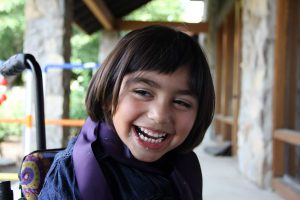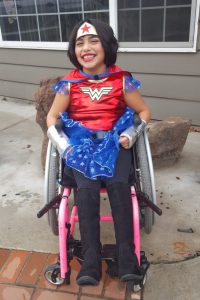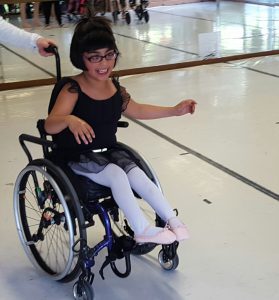
Throughout 7-year-old Priscilla Campos’ life, she’s been empowered by her parents to try new things. Her mother, Shannon Cruz, says their family lives by a simple motto: The sky is the limit.
It’s a lesson Priscilla has taken to heart. She’s always believed she could do anything, and she’s proven she can.
“She reaches for the sky,” said Ruben Campos, Priscilla’s father. “There are no limitations. I always tell her she can do anything, and then she does. She’s incredible.”
An early diagnosis
When Priscilla was about 1 years old, she was diagnosed with cerebral palsy (CP), a neurological condition that affects muscle movement. About 2-3 in every 1,000 children is diagnosed with CP. Like many children with CP, Priscilla suffered from stiff and rigid muscles, limiting her mobility.
“She was my little pencil,” said Cruz. “She was always very stiff. Crawling wasn’t an option for her.”
Although CP can’t be cured, there are many different treatment options to help manage the condition.
“When she was born, she couldn’t do much,” said Campos. “After she was diagnosed, we intervened right away. We started with physical therapy and feeding therapy and did research about CP. We learned about everything and anything we could find.”
While researching treatment options, Campos discovered Seattle Children’s.
At Seattle Children’s, a team of specialists work together to determine the best option for each patient based on their unique needs, and so Priscilla and her family traveled from their home in Yakima to Seattle Children’s for treatment.
The road to selective dorsal rhizotomy
As a child, physical therapists, speech therapists and occupational therapists all worked with Priscilla to help increase her mobility and quality of life. Seattle Children’s became like a second home for the family. She was followed over several years by specialists in rehabilitation medicine, neurodevelopmental medicine and orthopedics.
Eventually, the Surgical Tone Management Clinic at Seattle Children’s evaluated Priscilla to see if neurosurgery would be an option to help increase her mobility even further.
 After the evaluation, Priscilla’s family decided to move forward with a surgery called selective dorsal rhizotomy (SDR).
After the evaluation, Priscilla’s family decided to move forward with a surgery called selective dorsal rhizotomy (SDR).
Selective dorsal rhizotomy is a surgery performed on the lower spinal cord to reduce spasticity, or high muscle tone. Certain nerve fibers responsible for the stiff muscle tone are identified and then carefully cut by a neurosurgeon.
“There aren’t a lot of places that offer SDR,” said Cruz. “We wanted to give Priscilla the opportunity at a better life. We wanted to give her the tools for more independence.”
At 4 years old, Priscilla underwent SDR.
“After the surgery, a whole new world opened up for her,” said Cruz. “She could sit up and had better balance. It was so empowering.”
Setting a new goal
After the procedure, Priscilla stayed at Seattle Children’s for nearly three weeks and underwent rigorous rehabilitation with a team of specialists, a key part of the SDR process. Seattle Children’s is the only hospital in the Pacific Northwest with the expertise to offer comprehensive care for children with CP including SDR, inpatient and outpatient rehabilitation and orthopedic surgery.
With the help of Priscilla’s care team, comprised of rehabilitation medicine doctors, physical therapists, occupational therapists, therapeutic recreation specialists and more, they designed a plan to help her reach new milestones.
Each day, she focused on controlling her muscle movements and building strength.
The sky is the limit
Three months later, at her first follow up appointment, Priscilla was showing tremendous progress.
“The movement of her legs increased,” said Erin Hooper, Tone Management Program manager at Seattle Children’s. “She seemed much happier and much more relaxed. She also had more control over her extremities.”
Back in her hometown of Yakima, Priscilla continued to receive physical therapy and occupational therapy two times a week. Just six months after the procedure, she was learning to balance and was trying to walk on her own.
“For me, this is the reason why we have this program,” said Hooper. “There are so many children who could benefit from this intervention. It works and has such an incredible impact on the lives of these children and families.”
A new life

Today, Priscilla is an active 7-year-old girl. Thanks to programs offered in Yakima, Priscilla continues to make progress.
“I am so proud of the comprehensive cerebral palsy program we have been able to offer Priscilla and other kids with CP,” said Susan Apkon, director of Seattle Children’s Department of Rehabilitation Medicine. “We are successful when kids and families return with stories about the adventures their child is experiencing, sometimes for the first time, like dancing and bowling, activities Priscilla has enjoyed so much. While these are common activities for children without CP, for a child like Priscilla, it can be life-changing.”
Priscilla still faces limitations and needs to use a wheelchair, but she doesn’t let it hold her back. Priscilla participates in adaptive ballet, horseback riding, ice skating, roller skating, skiing and bowling. She’s not afraid to try new things. With a smile on her face, she continues to conquer milestones.
“She gets really excited to participate in sports,” said Cruz. “SDR was life-changing. I knew the procedure wasn’t going to change her condition. She’s always going to have CP, but it’s made a big difference. I hope her story inspires people.”
One day, Priscilla hopes to be able to dance with her dad, without a wheelchair. It’s a goal she says she’s going to reach.
“I brag a lot about Priscilla,” said Campos. “She’s accomplished so many things. She’s my world. She’s my everything.”
For more information about selective dorsal rhiztomoy, please contact 206-987-2544.
Resources:
- Learn more about selective dorsal rhizotomy (SDR)
- Seattle Children’s Rehabilitation Medicine
- Seattle Children’s Neurosurgery
- Cerebral Palsy and Spasticity Treatment
- Adaptive Sports Physical Therapy

